Deck 8: Combining Xml and Php
Question
Question
Question
Question
Question
Question
Question
Question
Question
Question
Question
Question
Question
Question
Question
Question
Question
Question
Question
Question
Question
Question
Question
Question
Question
Question
Question
Question
Question
Question
Question
Question
Question
Question
Question
Question
Question
Question
Question
Question
Question
Question
Question
Question
Question
Question
Question
Question
Question
Question
Question
Question
Question
Question
Question
Question
Question
Question
Question
Question
Question
Question
Question
Question
Question
Question
Question
Question
Question
Question
Question
Question
Question
Question
Question
Question
Question
Question
Question
Question

Unlock Deck
Sign up to unlock the cards in this deck!
Unlock Deck
Unlock Deck
1/91
Play
Full screen (f)
Deck 8: Combining Xml and Php
1
With grouping in sequence , all items from the population that share the same grouping key value are grouped together.
False
2
The retrieve() function is an XPath 2.0 function used to retrieve XML data from external files.
False
3
The current date is displayed using the default XPath date format mm-dd-yyyy-tz.
False
4
XPath 2.0 is fundamentally based on tokenized values, which are values that cannot be broken into smaller parts.

Unlock Deck
Unlock for access to all 91 flashcards in this deck.
Unlock Deck
k this deck
5
User-defined functions are treated like built-in functions and thus can be run from within an XPath 2.0 expression.

Unlock Deck
Unlock for access to all 91 flashcards in this deck.
Unlock Deck
k this deck
6
Under XSLT 2.0, the value-of element returns all of the node values in a node set and not just the first node value.

Unlock Deck
Unlock for access to all 91 flashcards in this deck.
Unlock Deck
k this deck
7
In XSLT 1.0, there are several numeric data types including xs:integer , xs:decimal , xs:float , and xs:double .

Unlock Deck
Unlock for access to all 91 flashcards in this deck.
Unlock Deck
k this deck
8
One of the uses of the duration functions is to increase a date or time value by a specified amount.

Unlock Deck
Unlock for access to all 91 flashcards in this deck.
Unlock Deck
k this deck
9
The group-by attribute specifies the node set containing the grouped values.

Unlock Deck
Unlock for access to all 91 flashcards in this deck.
Unlock Deck
k this deck
10
An XPath 2.0 sequence cannot contain duplicate nodes.

Unlock Deck
Unlock for access to all 91 flashcards in this deck.
Unlock Deck
k this deck
11
XPath 2.0 data formats use picture markers to specify how dates and times should be rendered.

Unlock Deck
Unlock for access to all 91 flashcards in this deck.
Unlock Deck
k this deck
12
The doc() function is more flexible than the document() function.

Unlock Deck
Unlock for access to all 91 flashcards in this deck.
Unlock Deck
k this deck
13
The names of all user-defined functions need to be placed within a(n) namespace to ensure that the function name does not conflict with names reserved in the standard function library.

Unlock Deck
Unlock for access to all 91 flashcards in this deck.
Unlock Deck
k this deck
14
Grouping data is made much easier in XSLT 2.0 with the for-each-group element.

Unlock Deck
Unlock for access to all 91 flashcards in this deck.
Unlock Deck
k this deck
15
Empty sequences are entered as () .

Unlock Deck
Unlock for access to all 91 flashcards in this deck.
Unlock Deck
k this deck
16
The [FNn] marker displays the weekday name in title case.

Unlock Deck
Unlock for access to all 91 flashcards in this deck.
Unlock Deck
k this deck
17
Regular expression symbols have opposite meanings when expressed in uppercase letters.

Unlock Deck
Unlock for access to all 91 flashcards in this deck.
Unlock Deck
k this deck
18
The format-dateTime() function cannot be used with international dates and times.

Unlock Deck
Unlock for access to all 91 flashcards in this deck.
Unlock Deck
k this deck
19
XPath 2.0 functions do not allow the programmer to create structured content in which resulting text strings are placed with element or attribute nodes.

Unlock Deck
Unlock for access to all 91 flashcards in this deck.
Unlock Deck
k this deck
20
The second step in importing data from a CSV file is to read the content of the file into the style sheet as a text string.

Unlock Deck
Unlock for access to all 91 flashcards in this deck.
Unlock Deck
k this deck
21
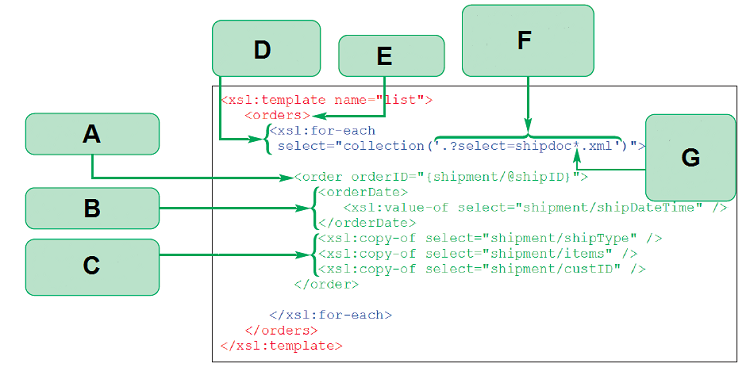
The code in the accompanying figure illustrates the use of the collection() function. The area labeled _____ creates a collection of XML files starting with "shipdoc" in the current folder.
A) A
B) B
C) E
D) F

Unlock Deck
Unlock for access to all 91 flashcards in this deck.
Unlock Deck
k this deck
22
To apply a style to each file in a collection, you can use the collection() function within the _____ element.
A) for-each
B) apply-all
C) for-each-group
D) while
A) for-each
B) apply-all
C) for-each-group
D) while

Unlock Deck
Unlock for access to all 91 flashcards in this deck.
Unlock Deck
k this deck
23
XPath 2.0 replaces the XPath 1.0 concept of the _____ with sequences, where a sequence is any ordered list of items.
A) list
B) data set
C) library
D) node set
A) list
B) data set
C) library
D) node set

Unlock Deck
Unlock for access to all 91 flashcards in this deck.
Unlock Deck
k this deck
24
XML nodes with the _____ data type can be associated with any type of XML node.
A) node()
B) element()
C) item()
D) text()
A) node()
B) element()
C) item()
D) text()

Unlock Deck
Unlock for access to all 91 flashcards in this deck.
Unlock Deck
k this deck
25
The data type of an atomic value is specified using the _____ attribute.
A) using
B) as
C) type
D) dataType
A) using
B) as
C) type
D) dataType

Unlock Deck
Unlock for access to all 91 flashcards in this deck.
Unlock Deck
k this deck
26
To display the current date and time, use the XPath 2.0 function _____.
A) current-date()
B) today()
C) date()
D) current-time()
A) current-date()
B) today()
C) date()
D) current-time()

Unlock Deck
Unlock for access to all 91 flashcards in this deck.
Unlock Deck
k this deck
27
XPath 2.0 allows the programmer to retrieve data from multiple document sources using the _____ function.
A) doc()
B) copy()
C) import()
D) collection()
A) doc()
B) copy()
C) import()
D) collection()

Unlock Deck
Unlock for access to all 91 flashcards in this deck.
Unlock Deck
k this deck
28
To return a sequence item by its position, use the predicate _____.
A) index-of[position]
B) sequence[value]
C) sequence[position]
D) index-of[value]
A) index-of[position]
B) sequence[value]
C) sequence[position]
D) index-of[value]

Unlock Deck
Unlock for access to all 91 flashcards in this deck.
Unlock Deck
k this deck
29
To apply a transformation that involves a named template using Saxon in Java command line mode, enter the command _____ within a command prompt window.
A) java net.sf.saxon.Transform -it:template style -o:output
B) java net.sf.saxon.Transform -t:template style -o:output
C) java net.sf.saxon.Transform template style -o:output
D) java net.sf.saxon.Transform -i:template style -o:output
A) java net.sf.saxon.Transform -it:template style -o:output
B) java net.sf.saxon.Transform -t:template style -o:output
C) java net.sf.saxon.Transform template style -o:output
D) java net.sf.saxon.Transform -i:template style -o:output

Unlock Deck
Unlock for access to all 91 flashcards in this deck.
Unlock Deck
k this deck
30
Sequences can be entered directly as a _____ list of values enclosed within a set of parentheses.
A) comma-separated
B) tab-delimited
C) fixed width
D) colon-separated
A) comma-separated
B) tab-delimited
C) fixed width
D) colon-separated

Unlock Deck
Unlock for access to all 91 flashcards in this deck.
Unlock Deck
k this deck
31
The format-dateTime() function can be used only with values of the data type _____.
A) xs:date
B) xs:dateTime
C) xs:time
D) xs:dateFormat
A) xs:date
B) xs:dateTime
C) xs:time
D) xs:dateFormat

Unlock Deck
Unlock for access to all 91 flashcards in this deck.
Unlock Deck
k this deck
32
You can create atomic values based on XML Schema data types using the constructor function, which has the syntax _____.
A) xs:constructor(dataType="value")
B) dataType(xs:value)
C) constructor:xs(dataType="value")
D) xs:dataType(value)
A) xs:constructor(dataType="value")
B) dataType(xs:value)
C) constructor:xs(dataType="value")
D) xs:dataType(value)

Unlock Deck
Unlock for access to all 91 flashcards in this deck.
Unlock Deck
k this deck
33
XPath 1.0 is limited to essentially three data types: text, numbers, and _____.
A) Boolean values
B) sequences
C) date values
D) time durations
A) Boolean values
B) sequences
C) date values
D) time durations

Unlock Deck
Unlock for access to all 91 flashcards in this deck.
Unlock Deck
k this deck
34
In XPath 2.0, the _____ symbol acts as a concatenation operator by combining two sequences while maintaining the sequence order.
A) comma ( , )
B) period ( . )
C) plus sign ( + )
D) hyphen ( - )
A) comma ( , )
B) period ( . )
C) plus sign ( + )
D) hyphen ( - )

Unlock Deck
Unlock for access to all 91 flashcards in this deck.
Unlock Deck
k this deck
35
A(n) _____ XSLT processor supports data types defined in user-created schemas in addition to the core functionality of XSLT 2.0.
A) basic
B) schema-aware
C) default
D) advanced
A) basic
B) schema-aware
C) default
D) advanced

Unlock Deck
Unlock for access to all 91 flashcards in this deck.
Unlock Deck
k this deck
36
The first step in converting an existing XSLT 1.0 style sheet into an XSLT 2.0 style sheet is to set the version number in the _____ element to 2.0.
A) root
B) output
C) stylesheet
D) xml
A) root
B) output
C) stylesheet
D) xml

Unlock Deck
Unlock for access to all 91 flashcards in this deck.
Unlock Deck
k this deck
37
In the XPath 1.0 data model, nodes are processed in _____ order.
A) attribute
B) element
C) document
D) ascending
A) attribute
B) element
C) document
D) ascending

Unlock Deck
Unlock for access to all 91 flashcards in this deck.
Unlock Deck
k this deck
38
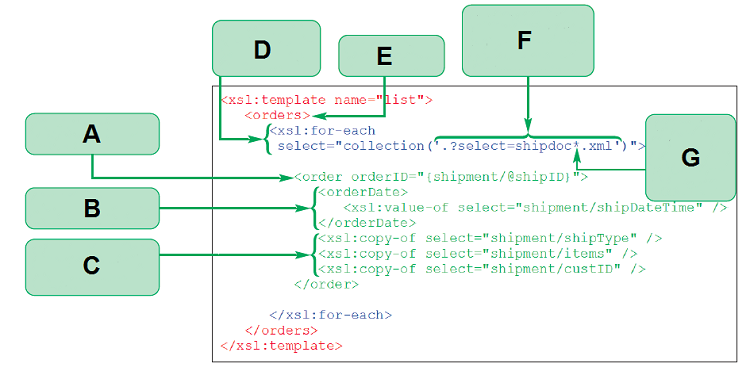
The code in the accompanying figure illustrates the use of the collection() function. The area labeled _____ copies the shipType , items , and custID elements.
A) B
B) C
C) D
D) F

Unlock Deck
Unlock for access to all 91 flashcards in this deck.
Unlock Deck
k this deck
39
In XPath 2.0, date and time values can be stored using the _____ data type.
A) xs:date
B) xs:time
C) xs:dateTime
D) xs:timeDate
A) xs:date
B) xs:time
C) xs:dateTime
D) xs:timeDate

Unlock Deck
Unlock for access to all 91 flashcards in this deck.
Unlock Deck
k this deck
40
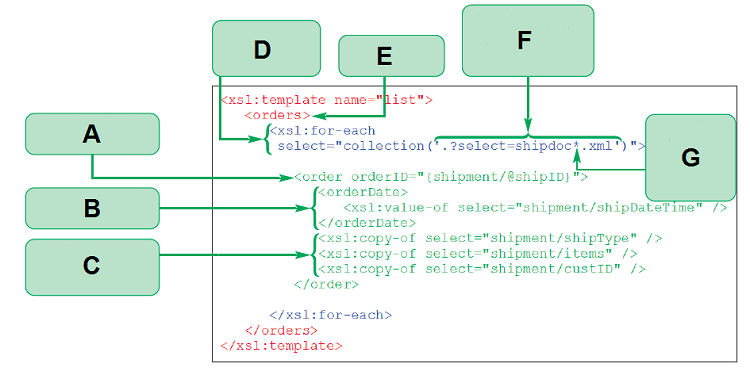
The code in the accompanying figure illustrates the use of the collection() function. The area labeled _____ loops through each XML file in the collection.
A) A
B) D
C) E
D) G

Unlock Deck
Unlock for access to all 91 flashcards in this deck.
Unlock Deck
k this deck
41
When used to format a date value, the marker _____ displays the Era component.
A) P
B) f
C) C
D) E
A) P
B) f
C) C
D) E

Unlock Deck
Unlock for access to all 91 flashcards in this deck.
Unlock Deck
k this deck
42
The Xpath 2.0 function _____ returns an xs:dateTime data value based on an xs:date and xs:time value.
A) current-date()
B) dateTime(date, time)
C) day-from-date(date)
D) current-dateTime()
A) current-date()
B) dateTime(date, time)
C) day-from-date(date)
D) current-dateTime()

Unlock Deck
Unlock for access to all 91 flashcards in this deck.
Unlock Deck
k this deck
43
XPath 2.0 introduced the _____ function to retrieve data from external XML files.
A) document()
B) import()
C) retrieve()
D) doc()
A) document()
B) import()
C) retrieve()
D) doc()

Unlock Deck
Unlock for access to all 91 flashcards in this deck.
Unlock Deck
k this deck
44
The regular expression flag _____ specifies that white space characters within the regular expression should be ignored.
A) i
B) s
C) m
D) x
A) i
B) s
C) m
D) x

Unlock Deck
Unlock for access to all 91 flashcards in this deck.
Unlock Deck
k this deck
45
When used to format a date value, the marker _____ displays the Day of week component.
A) D
B) f
C) F
D) W
A) D
B) f
C) F
D) W

Unlock Deck
Unlock for access to all 91 flashcards in this deck.
Unlock Deck
k this deck
46
When used to format a date value, the marker _____ displays the Fractional seconds component.
A) D
B) f
C) F
D) s
A) D
B) f
C) F
D) s

Unlock Deck
Unlock for access to all 91 flashcards in this deck.
Unlock Deck
k this deck
47
The _____ attribute assumes that the population is sorted in a specific order and that order will be retained when the population is grouped.
A) group-by
B) group-adjacent
C) group-starting-with
D) group-ending-with
A) group-by
B) group-adjacent
C) group-starting-with
D) group-ending-with

Unlock Deck
Unlock for access to all 91 flashcards in this deck.
Unlock Deck
k this deck
48
The regular expression flag _____ specifies that matches should be applied so that the " . " character will match any character in the text string.
A) i
B) s
C) m
D) x
A) i
B) s
C) m
D) x

Unlock Deck
Unlock for access to all 91 flashcards in this deck.
Unlock Deck
k this deck
49
When used to format a date value, the marker _____ displays the A.M. or P.M. component.
A) P
B) f
C) C
D) E
A) P
B) f
C) C
D) E

Unlock Deck
Unlock for access to all 91 flashcards in this deck.
Unlock Deck
k this deck
50
To specify multiple output file destinations for the transformation result use the _____ element.
A) result-document
B) multiple-output
C) multiple-result
D) output-document
A) result-document
B) multiple-output
C) multiple-result
D) output-document

Unlock Deck
Unlock for access to all 91 flashcards in this deck.
Unlock Deck
k this deck
51
When groups are based on a value using either the group-by or group-adjacent attribute, the key value associated with the current group is returned using the XPath 2.0 function _____.
A) current-key()
B) grouping-key()
C) current-grouping-key()
D) key()
A) current-key()
B) grouping-key()
C) current-grouping-key()
D) key()

Unlock Deck
Unlock for access to all 91 flashcards in this deck.
Unlock Deck
k this deck
52
The regular expression flag _____ specifies that matches should be carried out without respect to upper- or lowercase.
A) i
B) s
C) m
D) x
A) i
B) s
C) m
D) x

Unlock Deck
Unlock for access to all 91 flashcards in this deck.
Unlock Deck
k this deck
53
The regular expression flag _____ specifies that matches should be carried out in multiline mode so that the ^ character marks the beginning of a line and the $ character marks the ending of a line.
A) i
B) s
C) m
D) x
A) i
B) s
C) m
D) x

Unlock Deck
Unlock for access to all 91 flashcards in this deck.
Unlock Deck
k this deck
54
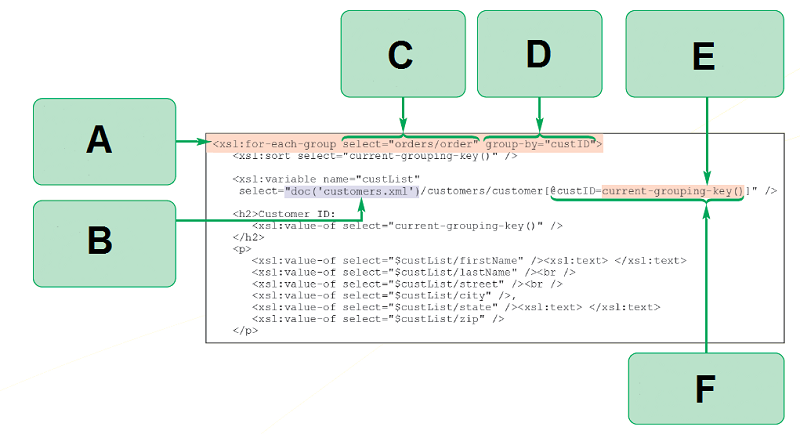
The accompanying figure illustrates the code used to implement grouping in XSLT 2.0. In the figure, item _____ marks the code used to display the customer whose custID attribute equals the current grouping key.
A) B
B) C
C) D
D) F

Unlock Deck
Unlock for access to all 91 flashcards in this deck.
Unlock Deck
k this deck
55
You can learn information about your processor and what it supports by running the _____ function within your style sheet.
A) system-property()
B) processor-property()
C) system-information()
D) processor-information()
A) system-property()
B) processor-property()
C) system-information()
D) processor-information()

Unlock Deck
Unlock for access to all 91 flashcards in this deck.
Unlock Deck
k this deck
56
If you are working in command line mode, you can keep the Command window open and press the _____ key on your keyboard to recall the previous command rather than retyping it.
A) down arrow
B) Escape
C) up arrow
D) tilde
A) down arrow
B) Escape
C) up arrow
D) tilde

Unlock Deck
Unlock for access to all 91 flashcards in this deck.
Unlock Deck
k this deck
57
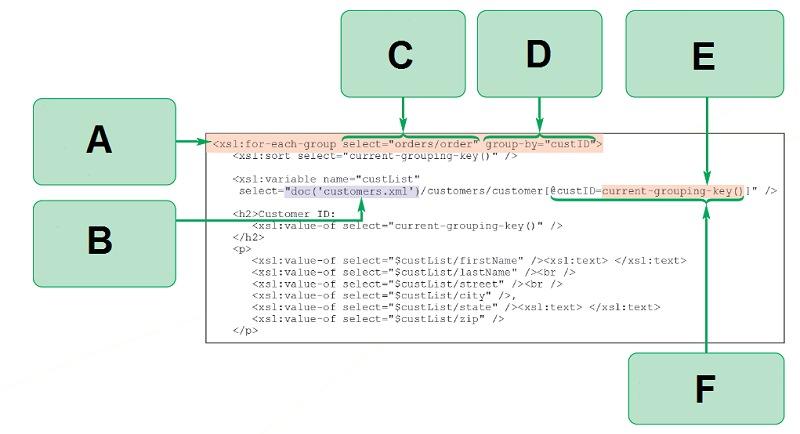
The accompanying figure illustrates the code used to implement grouping in XSLT 2.0. In the figure, item _____ marks the attribute used to specify the node set containing the grouped values.
A) B
B) C
C) D
D) F

Unlock Deck
Unlock for access to all 91 flashcards in this deck.
Unlock Deck
k this deck
58
In XSLT 2.0, the values returned by user-defined functions are _____.
A) sequences
B) nodes
C) variables
D) predicates
A) sequences
B) nodes
C) variables
D) predicates

Unlock Deck
Unlock for access to all 91 flashcards in this deck.
Unlock Deck
k this deck
59
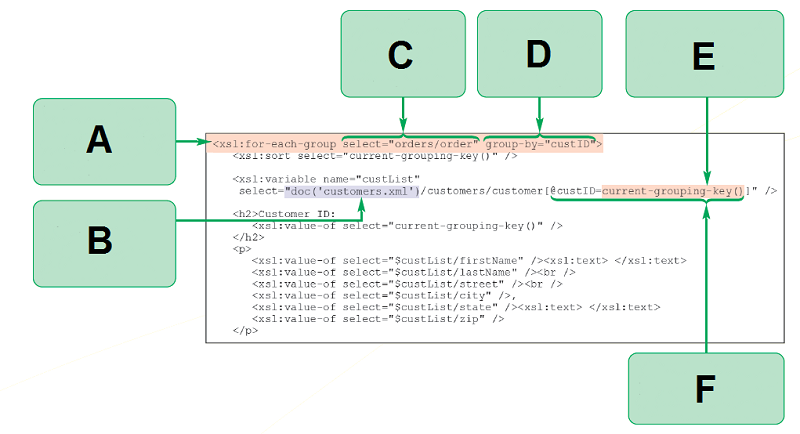
The accompanying figure illustrates the code used to implement grouping in XSLT 2.0. In the figure, item _____ marks the attribute used to specify the values used to distinguish between groups.
A) B
B) C
C) D
D) F

Unlock Deck
Unlock for access to all 91 flashcards in this deck.
Unlock Deck
k this deck
60
XPath 2.0 provides the _____ function to read non-XML data.
A) read-text()
B) parsed-text()
C) unparsed-text()
D) import-text()
A) read-text()
B) parsed-text()
C) unparsed-text()
D) import-text()

Unlock Deck
Unlock for access to all 91 flashcards in this deck.
Unlock Deck
k this deck
61
Sydney is building an application with XSLT 2.0 that relies on many date formats and calculations. He comes to you for some assistance in developing these formats and calculations correctly. Sydney has been adding several more date calculations to the application, but has encountered an error. He has been trying to store values for changes in dates and times, but the values displaying in the result document are not at all what he expected them to be. In looking over his code, you remind him that he must use the _____ data type to store changes in dates and times.
A) xs:duration
B) xs:dateTime
C) xs:timeChange
D) xs:time
A) xs:duration
B) xs:dateTime
C) xs:timeChange
D) xs:time

Unlock Deck
Unlock for access to all 91 flashcards in this deck.
Unlock Deck
k this deck
62
Sydney is building an application with XSLT 2.0 that relies on many date formats and calculations. He comes to you for some assistance in developing these formats and calculations correctly. Sydney would like the value of the birthDate element output in the format "9/2/2017". Which of the following functions do you recommend he use to achieve this formatting correctly?
A) format-date(birthDate,'[MNn]/[D]/[Y]')
B) format-date(birthDate,'[M]/[D,2]/[Y]')
C) format-date(birthDate,'[M]/[d]/[Y]')
D) format-date(birthDate,'[M]/[D]/[Y]')
A) format-date(birthDate,'[MNn]/[D]/[Y]')
B) format-date(birthDate,'[M]/[D,2]/[Y]')
C) format-date(birthDate,'[M]/[d]/[Y]')
D) format-date(birthDate,'[M]/[D]/[Y]')

Unlock Deck
Unlock for access to all 91 flashcards in this deck.
Unlock Deck
k this deck
63
A common practice is to place XPath 2.0 functions within the http://www.w3.org/2005/xpathfunctions namespace using the _____ namespace prefix.
A) fx
B) xfn
C) fn
D) xfx
A) fx
B) xfn
C) fn
D) xfx

Unlock Deck
Unlock for access to all 91 flashcards in this deck.
Unlock Deck
k this deck
64
May has experience developing applications using XSLT 1.0, and would like to take advantage of some of the added features of XSLT 2.0 in developing a new application. She comes to you for help implementing some of these new features.
May is trying to create a variable named productData that contains a sequence of zero to many element nodes, referenced by the XPath expression //products . You suggest she use the syntax _____ to create this variable.
A)
B)
C)
D)
May is trying to create a variable named productData that contains a sequence of zero to many element nodes, referenced by the XPath expression //products . You suggest she use the syntax _____ to create this variable.
A)
B)
C)
D)

Unlock Deck
Unlock for access to all 91 flashcards in this deck.
Unlock Deck
k this deck
65
Sydney is building an application with XSLT 2.0 that relies on many date formats and calculations. He comes to you for some assistance in developing these formats and calculations correctly. One section of the new application requires Sydney to add 2 years and 6 months to the current date. Which of the following expressions do you tell him will provide the correct result?
A) current-date() + xs:yearMonthDuration('p2y6m')
B) current-date() + xs:yearMonthDuration('PY2M6')
C) current-date() + xs:yearMonthDuration('P2Y6M')
D) current-date() + xs:yearMonthDuration('py2m6')
A) current-date() + xs:yearMonthDuration('p2y6m')
B) current-date() + xs:yearMonthDuration('PY2M6')
C) current-date() + xs:yearMonthDuration('P2Y6M')
D) current-date() + xs:yearMonthDuration('py2m6')

Unlock Deck
Unlock for access to all 91 flashcards in this deck.
Unlock Deck
k this deck
66
May has experience developing applications using XSLT 1.0, and would like to take advantage of some of the added features of XSLT 2.0 in developing a new application. She comes to you for help implementing some of these new features.
May is familiar with working with a wide variety of node types in XPath 1.0, but is confused when changing to the atomic values used in XPath 2.0. You explain to her that each atomic value has a data type that describes the kind of data it contains, and this data type is specified using the _____ attribute.
A) select
B) use
C) type
D) as
May is familiar with working with a wide variety of node types in XPath 1.0, but is confused when changing to the atomic values used in XPath 2.0. You explain to her that each atomic value has a data type that describes the kind of data it contains, and this data type is specified using the _____ attribute.
A) select
B) use
C) type
D) as

Unlock Deck
Unlock for access to all 91 flashcards in this deck.
Unlock Deck
k this deck
67
Sydney is building an application with XSLT 2.0 that relies on many date formats and calculations. He comes to you for some assistance in developing these formats and calculations correctly. Once complete, Sydney will be localizing the application to international markets. Which of the following optional arguments of the format-date() function will be useful for this purpose?
A) calendar
B) clock
C) timeCode
D) region
A) calendar
B) clock
C) timeCode
D) region

Unlock Deck
Unlock for access to all 91 flashcards in this deck.
Unlock Deck
k this deck
68
The _____ function returns the location of an item in a sequence.

Unlock Deck
Unlock for access to all 91 flashcards in this deck.
Unlock Deck
k this deck
69
You can create atomic values based on XML Schema data types using the _____ function.

Unlock Deck
Unlock for access to all 91 flashcards in this deck.
Unlock Deck
k this deck
70
Sydney is building an application with XSLT 2.0 that relies on many date formats and calculations. He comes to you for some assistance in developing these formats and calculations correctly. Sydney would like to add the current date to the top of the output in the format "September 7, 2017". Which of the following functions do you recommend he use to achieve this formatting correctly?
A) format-date(current-date() ,'[MN] [D] [Y]')
B) format-date(current-date() ,'[MNn] [D] [Y]')
C) format-date(current-date() ,'[Mn] [D] [Y]')
D) format-date(current-date() ,'[MNn] [D,2] [Y]')
A) format-date(current-date() ,'[MN] [D] [Y]')
B) format-date(current-date() ,'[MNn] [D] [Y]')
C) format-date(current-date() ,'[Mn] [D] [Y]')
D) format-date(current-date() ,'[MNn] [D,2] [Y]')

Unlock Deck
Unlock for access to all 91 flashcards in this deck.
Unlock Deck
k this deck
71
Each atomic value has a(n) _____ that describes the kind of data it contains.

Unlock Deck
Unlock for access to all 91 flashcards in this deck.
Unlock Deck
k this deck
72
A(n) _____ is any ordered list of items and replaces the concept of node sets used in XSLT 1.0.

Unlock Deck
Unlock for access to all 91 flashcards in this deck.
Unlock Deck
k this deck
73
Make sure you use the format-dateTime() function only with values of the data type _____.

Unlock Deck
Unlock for access to all 91 flashcards in this deck.
Unlock Deck
k this deck
74
May has experience developing applications using XSLT 1.0, and would like to take advantage of some of the added features of XSLT 2.0 in developing a new application. She comes to you for help implementing some of these new features.
May is working with regular expressions, and would like to write a function that splits the contents of the employees element into a sequence of strings at every occurrence of a white space character such as a blank space, tab, or newline character. You recommend she use the function _____.
A) tokenize(employees, '\s-')
B) tokenize(employees, '\x+')
C) tokenize(employees, '\s+')
D) tokenize(employees, '\x-')
May is working with regular expressions, and would like to write a function that splits the contents of the employees element into a sequence of strings at every occurrence of a white space character such as a blank space, tab, or newline character. You recommend she use the function _____.
A) tokenize(employees, '\s-')
B) tokenize(employees, '\x+')
C) tokenize(employees, '\s+')
D) tokenize(employees, '\x-')

Unlock Deck
Unlock for access to all 91 flashcards in this deck.
Unlock Deck
k this deck
75
The _____ function can be used to provide an easy-to-read date format.

Unlock Deck
Unlock for access to all 91 flashcards in this deck.
Unlock Deck
k this deck
76
May has experience developing applications using XSLT 1.0, and would like to take advantage of some of the added features of XSLT 2.0 in developing a new application. She comes to you for help implementing some of these new features.
May has heard that XPath 2.0 allows an application to retrieve data from multiple document sources. She would like to be able to retrieve data from all XML files in the same folder as the current style sheet. You suggest she use the function _____ to enable this situation.
A) collection('/?select=*.xml')
B) document() '.?select=*.xml')
C) collection('.?select=*.xml')
D) document() '/?select=*.xml')
May has heard that XPath 2.0 allows an application to retrieve data from multiple document sources. She would like to be able to retrieve data from all XML files in the same folder as the current style sheet. You suggest she use the function _____ to enable this situation.
A) collection('/?select=*.xml')
B) document() '.?select=*.xml')
C) collection('.?select=*.xml')
D) document() '/?select=*.xml')

Unlock Deck
Unlock for access to all 91 flashcards in this deck.
Unlock Deck
k this deck
77
The collection() function collection('.?select=*.xml') uses the "_____" character to reference the folder of the current style sheet.
A) )
B) ?
C) *
D) '
A) )
B) ?
C) *
D) '

Unlock Deck
Unlock for access to all 91 flashcards in this deck.
Unlock Deck
k this deck
78
May has experience developing applications using XSLT 1.0, and would like to take advantage of some of the added features of XSLT 2.0 in developing a new application. She comes to you for help implementing some of these new features.
May would like to apply a style to each file in a collection. Which of the following do you tell her shows the correct syntax to achieve this result?
A) collection( uri )
B) styles
C) styles
D) collection( uri )
May would like to apply a style to each file in a collection. Which of the following do you tell her shows the correct syntax to achieve this result?
A)
B)
C)
D)

Unlock Deck
Unlock for access to all 91 flashcards in this deck.
Unlock Deck
k this deck
79
In XSLT 2.0, time differences are entered as _____, using the xs:dayTimeDuration data type.

Unlock Deck
Unlock for access to all 91 flashcards in this deck.
Unlock Deck
k this deck
80
XPath 2.0 is fundamentally based on _____ values, which are values that cannot be broken into smaller parts.

Unlock Deck
Unlock for access to all 91 flashcards in this deck.
Unlock Deck
k this deck



